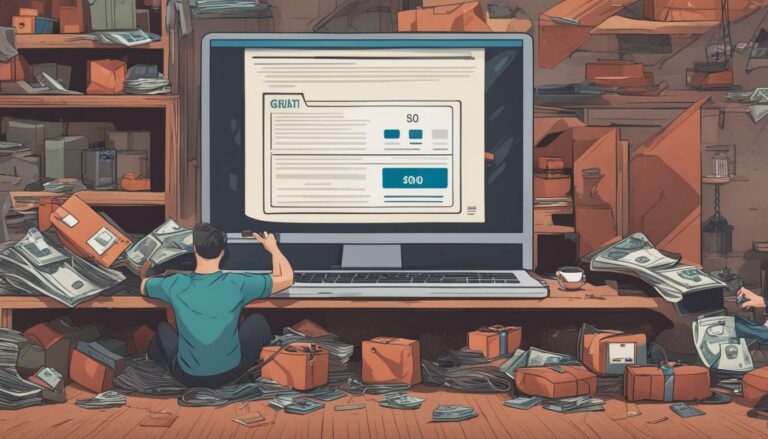Understanding the Impact of Credit Scores on Mental Health

Credit scores can have a profound influence on mental health, affecting individuals’ emotional and psychological well-being. It is crucial to understand the impact credit scores can have on various aspects of a person’s life. Having a low credit score can lead to excess stress, depression, and anxiety as it restricts the ability to buy a house, rent an apartment, or qualify for loans. Moreover, poor credit scores and debt can result in negative sleeping patterns, difficulty focusing, physical stress, and an increased risk of irresponsible behavior.
Key Takeaways:
- Credit scores can significantly impact mental health, leading to stress, depression, and anxiety.
- Individuals struggling with mental health issues are more likely to have trouble managing their money and falling into a cycle of poor credit and worsening financial choices.
- Seeking assistance from a financial advisor or credit counselor can help break the cycle and improve financial well-being.
- Developing positive financial habits, such as paying bills on time, is essential for improving credit scores and achieving financial goals.
- Protecting credit information and practicing self-compassion can also play a significant role in reducing stress levels associated with low credit scores.
The Link Between Credit Scores and Emotional Well-being
Your financial stability, as reflected by your credit scores, can significantly impact your emotional well-being. When your credit scores are low and you face financial instability, it can lead to increased stress, anxiety, and even depression. The limitations imposed by poor credit scores can affect various aspects of your life, from your ability to secure housing to qualifying for loans.
Research has shown that individuals with poor credit scores and mounting debt often experience negative sleeping patterns, difficulty focusing, and physical stress. These pressures can further contribute to a heightened risk of engaging in irresponsible financial behavior. It becomes a vicious cycle, where mental health issues can make it challenging to manage money effectively, leading to poor credit scores, which in turn exacerbate financial difficulties.
🚨 TUIC Errors + Low Credit Score?
CreditScoreIQ helps you build credit faster by reporting utility bills to all 3 bureaus—while you dispute errors.
Start Building Credit Today →Breaking this cycle is crucial for improving your emotional well-being. Seeking assistance from a financial advisor or credit counselor can provide valuable guidance in managing your finances and working towards better credit scores. Developing positive financial habits, such as making timely payments on credit cards and bills, is essential for improving your credit scores and achieving your financial goals.
Protecting your credit information is equally important to prevent identity theft and further financial stress. By taking precautions, such as monitoring your credit reports regularly and safeguarding personal information, you can strengthen your overall financial security and enhance your peace of mind.

Practicing self-compassion is also a crucial aspect of maintaining good mental health despite credit score challenges. It involves being understanding and forgiving towards yourself, recognizing that financial difficulties do not define your worth as an individual. By focusing on self-care and nurturing a positive mindset, you can better navigate the emotional impact of credit scores and find solace in knowing that your mental well-being is not solely determined by your financial situation.
The Psychological Stress of Poor Credit Scores
Poor credit scores can lead to significant psychological stress and impact your ability to stay resilient in the face of financial challenges. The limitations imposed by a low credit score, such as difficulty obtaining loans or securing housing, can cause feelings of frustration, anxiety, and hopelessness. This stress can seep into other aspects of your life, affecting your mental well-being and overall quality of life.
Research has shown that individuals with poor credit scores are more likely to experience symptoms of anxiety and depression. The constant worry about financial stability and the fear of being judged based on your creditworthiness can take a toll on your mental health. It can create a constant state of stress and unease, making it difficult to focus on other important aspects of your life.
Furthermore, the psychological stress of poor credit scores can impact your ability to stay resilient in the face of financial challenges. It can lead to a negative cycle of financial decision-making, where individuals may resort to impulsive and risky behaviors in an attempt to alleviate their financial stress. This can further worsen their credit score and perpetuate the cycle of stress and poor mental well-being.
It is crucial to recognize the impact that credit scores can have on mental health and take proactive steps to manage and improve them. Seeking assistance from a financial advisor or credit counselor can provide valuable guidance and support in navigating your financial situation. Developing positive financial habits, such as paying bills on time and reducing debt, can also contribute to improving your credit score and reducing the psychological stress associated with it. Protecting your credit information from identity theft and practicing self-compassion are additional strategies that can help reduce stress levels and improve overall mental health.

| Ways to Manage Psychological Stress of Poor Credit Scores |
|---|
| Seek assistance from a financial advisor or credit counselor |
| Develop positive financial habits, such as paying bills on time |
| Protect your credit information |
| Practice self-compassion |
Managing Credit Scores for Better Mental Health
Taking proactive steps to manage your credit scores can have a positive impact on your mental health and overall life satisfaction. It is crucial to understand that credit scores play a significant role in various aspects of your life, from securing housing to qualifying for loans. Low credit scores can lead to excess stress, depression, and anxiety, as they restrict your financial options and create limitations.

Research has shown that individuals struggling with mental health issues are more likely to face difficulties in managing their money effectively. This creates a vicious cycle between poor credit and worsening financial choices. However, there are practical strategies you can implement to break free from this cycle and improve your credit scores.
- Develop positive financial habits: Start by paying off credit cards and bills on time to demonstrate financial responsibility. Create a budget and stick to it, ensuring that you allocate enough funds to meet your financial obligations and save for the future.
- Seek assistance from professionals: If you find yourself overwhelmed by your financial situation, consider consulting a financial advisor or credit counselor. They can provide guidance on debt management, budgeting, and improving your credit scores.
- Protect your credit information: Safeguarding your credit information is crucial to prevent identity theft and potential damage to your credit scores. Regularly review your credit reports, monitor your accounts for suspicious activity, and utilize secure online practices to keep your personal information safe.
Remember, managing your credit scores is a journey that requires commitment and patience. By taking proactive steps to improve your credit health, you can reduce stress and anxiety associated with low credit scores, enhance your financial well-being, and ultimately, achieve a higher level of overall life satisfaction.
Importance of Self-Compassion and Conclusion
Practicing self-compassion is crucial when navigating the impact of credit scores on your mental health. Understanding the connection between credit scores and emotional well-being is the first step towards improving your overall mental resilience. Factual data shows that individuals with low credit scores often experience excess stress, depression, and anxiety due to the limitations it imposes on their financial choices.
Research has revealed that individuals struggling with mental health issues are more likely to have difficulty managing their money, creating a vicious cycle between poor credit and worsening financial choices. Seeking assistance from a financial advisor or credit counselor can help break this cycle and provide guidance on how to improve your credit scores.
Developing positive financial habits is essential for improving credit scores and achieving your financial goals. Paying off credit cards and bills on time is a simple yet effective way to boost your creditworthiness. Additionally, taking precautions to protect your credit information can prevent identity theft and safeguard your financial well-being.
Lastly, it is important to practice self-compassion throughout this journey. Dealing with the impact of credit scores on your mental health can be challenging, but being kind to yourself and prioritizing self-care can significantly reduce stress levels associated with low credit scores. Remember that your worth is not defined solely by your credit score, and seeking support from loved ones or professionals can make a difference in your mental resilience and overall well-being.
FAQ
Q: How do credit scores impact mental health?
A: Credit scores can have a significant impact on mental health. People with low credit scores may experience excess stress, depression, and anxiety due to limitations on their ability to buy a house, rent an apartment, or qualify for loans.
Q: What are the psychological effects of poor credit scores?
A: Poor credit scores and debt can lead to negative sleeping patterns, difficulty focusing, physical stress, and an increased risk of irresponsible behavior. Individuals struggling with mental health issues are more likely to have trouble managing their money, creating a vicious cycle between poor credit and worsening financial choices.
Q: How can credit scores be managed for better mental health?
A: Seeking assistance from a financial advisor or credit counselor can help break the cycle of poor credit and worsening mental health. Developing positive financial habits, such as paying off credit cards and bills on time, is essential for improving credit scores and achieving financial goals.
Q: How can individuals protect their credit information?
A: It is crucial to take precautions to prevent identity theft and protect credit information. Safeguarding personal information, monitoring credit reports regularly, and using secure online platforms can help reduce the risk of identity theft and maintain good mental health.
Q: What role does self-compassion play in improving mental health related to credit scores?
A: Practicing self-compassion is essential for improving mental health and reducing stress levels associated with low credit scores. Recognizing that financial challenges do not define self-worth and seeking support from professionals or support networks can contribute to overall well-being despite credit score difficulties.
Ready to Improve Your Credit?
Disputing TUIC errors is step one. Step two? Boost your score by reporting utility payments with CreditScoreIQ.
Get Started Now (Only $1 Trial) →3-bureau reporting • $1M identity insurance • Dark web monitoring






